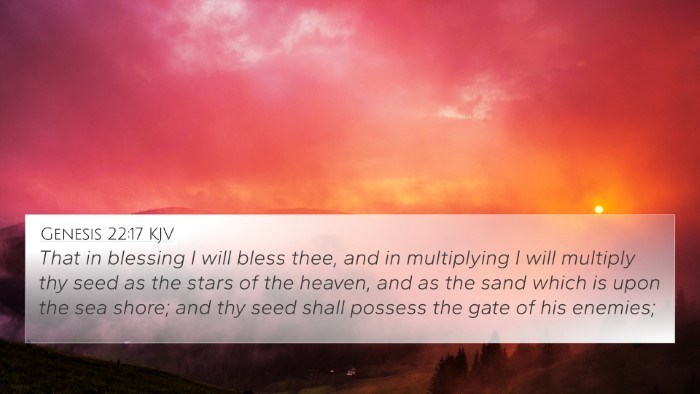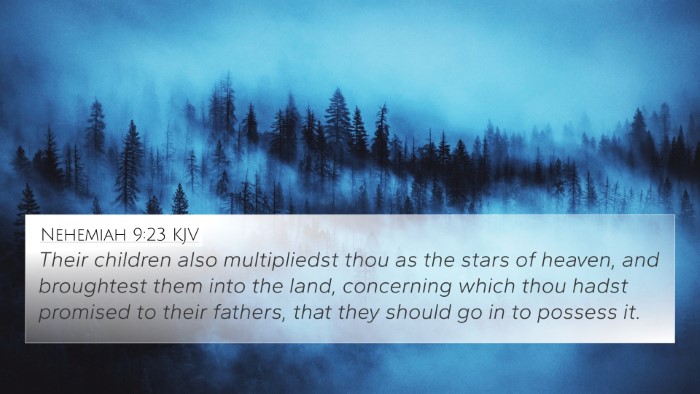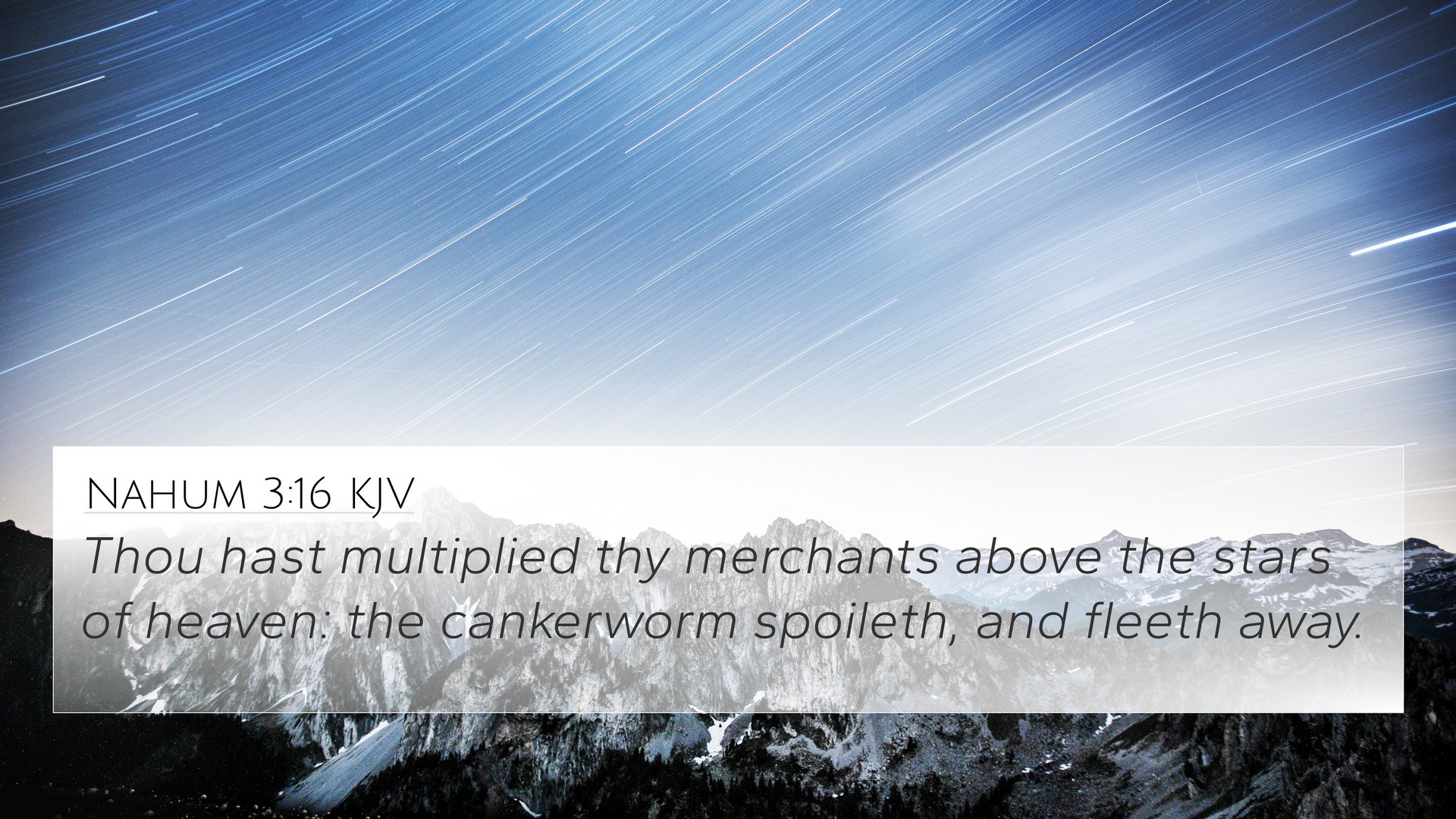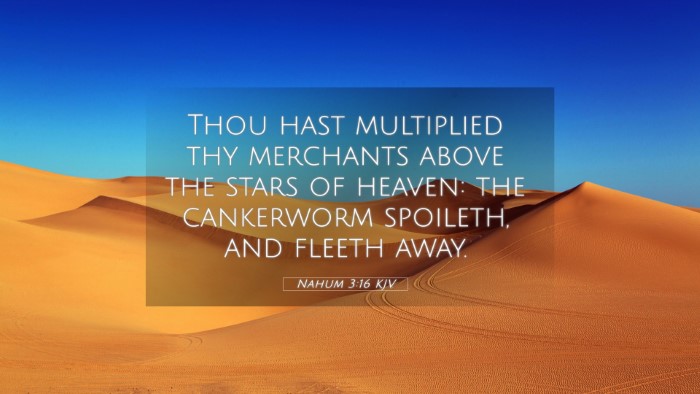Old Testament
Genesis Exodus Leviticus Numbers Deuteronomy Joshua Judges Ruth 1 Samuel 2 Samuel 1 Kings 2 Kings 1 Chronicles 2 Chronicles Ezra Nehemiah Esther Job Psalms Proverbs Ecclesiastes Song of Solomon Isaiah Jeremiah Lamentations Ezekiel Daniel Hosea Joel Amos Obadiah Jonah Micah Nahum Habakkuk Zephaniah Haggai Zechariah MalachiNahum 3:16 Similar Verses
Nahum 3:16 Cross References
Thou hast multiplied thy merchants above the stars of heaven: the cankerworm spoileth, and fleeth away.
Uncover the Rich Themes and Topics of This Bible Verse
Listed below are the Bible themes associated with Nahum 3:16. We invite you to explore each theme to gain deeper insights into the Scriptures.
Nahum 3:16 Cross Reference Verses
This section features a detailed cross-reference designed to enrich your understanding of the Scriptures. Below, you will find carefully selected verses that echo the themes and teachings related to Nahum 3:16 KJV. Click on any image to explore detailed analyses of related Bible verses and uncover deeper theological insights.

Genesis 22:17 (KJV) »
That in blessing I will bless thee, and in multiplying I will multiply thy seed as the stars of the heaven, and as the sand which is upon the sea shore; and thy seed shall possess the gate of his enemies;

Genesis 15:5 (KJV) »
And he brought him forth abroad, and said, Look now toward heaven, and tell the stars, if thou be able to number them: and he said unto him, So shall thy seed be.

Nehemiah 9:23 (KJV) »
Their children also multipliedst thou as the stars of heaven, and broughtest them into the land, concerning which thou hadst promised to their fathers, that they should go in to possess it.

Jeremiah 33:22 (KJV) »
As the host of heaven cannot be numbered, neither the sand of the sea measured: so will I multiply the seed of David my servant, and the Levites that minister unto me.
Nahum 3:16 Verse Analysis and Similar Verses
Nahum 3:16 - Interpretation and Meaning
Nahum 3:16 states: "Thou hast multiplied thy merchants above the stars of heaven: the cankerworm spoileth, and flieth away." This verse comes from the prophetic book of Nahum, which addresses the fall of Nineveh, the capital of the Assyrian Empire.
Summary of Interpretation
This verse highlights the overwhelming prosperity and commercial activity in Nineveh, indicating that the city has become a hub of trade. However, this abundance is contrasted with the impending judgment and destruction that Nahum prophesies. The "cankerworm" symbolizes the destruction that will come upon Nineveh, which will consume its resources and destroy its businesses, much like a pest that devours crops.
Commentary Insights
-
Matthew Henry:
Henry elaborates that the merchants of Nineveh, likened to the stars in number, demonstrate the city's incredible wealth, yet this wealth will not save them from destruction. Their prosperity will be rendered meaningless as divine wrath descends upon the city.
-
Albert Barnes:
Barnes notes that the "cankerworm" represents the swift deterioration of Nineveh's commercial strength, pointing to God's power to diminish what humans consider secure and permanent. This serves as a warning about trusting in material wealth.
-
Adam Clarke:
Clarke accentuates the image of merchants being plentiful, which speaks to human enterprise, but highlights that despite human efforts, the fate of Nineveh is sealed. The cankerworm indicates the inescapable fate that overcomes even the greatest cities and empires.
Cross-References
Nahum 3:16 can be understood better in the context of the following cross-references:
- Isaiah 47:15: "Thus shall they be unto thee with whom thou hast labored, even thy merchants, from thy youth." This verse portrays the fate of merchants when the judgment of God occurs.
- Jeremiah 51:13: "O thou that dwellest upon many waters, abundant in treasures, thine end is come, and the measure of thy covetousness." This parallels with Nahum's message of impending doom for wealth and merchants.
- Micah 5:10-11: "And it shall come to pass in that day, saith the Lord, that I will cut off thy horses out of the midst of thee." This indicates the competency of God to dismantle military and commercial power.
- Revelation 18:11-13: "And the merchants of the earth shall weep and mourn over her; for no man buyeth their merchandise any more." This echoes the fate of Nineveh and emphasizes the ultimate futility of wealth in the face of God’s judgment.
- Zephaniah 2:13-15: "And he will stretch out his hand against the north, and destroy Assyria." Here, the demise of Assyria is foretold, which includes Nineveh's fall.
- Ezekiel 27:34: "And in the time when thou shalt be broken by the seas in the depths of the waters," demonstrates how ultimate destruction can alter the fate of thriving mercantile cities.
- Proverbs 11:4: "Riches profit not in the day of wrath: but righteousness delivereth from death." This emphasizes the insignificance of earthly riches in divine judgment.
Thematic Connections
Thematically, Nahum 3:16 raises key issues regarding:
- Human Prosperity vs. Divine Judgment: The stark contrast between Nineveh's commercial success and the reality of impending judgment serves as a reminder of the temporary nature of worldly wealth.
- The Role of Merchants: The verse underlines the importance of accountability for those who engage in commerce and material pursuits, especially when they occur in the context of injustice.
- The Futility of Materialism: It warns against relying on human efforts and wealth, as these can be swiftly undermined by divine influence.
Tools for Bible Cross-Referencing
For deeper study and understanding of cross-references related to Nahum 3:16, consider the following tools:
- Bible Concordance: Use a concordance to find words and themes that link different passages.
- Bible Cross-Reference Guide: Guides can provide context for related verses and themes.
- Cross-Referencing Bible Study Methods: Learn various methods to systematically explore connections between verses.
- Bible Reference Resources: Utilize resources designed for thematic connections and cross-referencing.
Bible Verse Cross-References for Deeper Study
For anyone seeking to delve deeper, these practical steps can assist:
- How to find cross-references in the Bible: Start with a passage and look for similar themes or keywords in a concordance.
- Identifying connections between Old and New Testament: Notice how themes of judgment and mercy are echoed through different texts.
- Comparative study of Pauline epistles: Explore how Paul’s letters relate back to prophetic texts like Nahum.
- Cross-referencing Psalms with New Testament teachings: Look for how the themes of lament and destruction in Psalms reflect in the teachings of Christ.
Conclusion
The verse Nahum 3:16 serves as a stark reminder of the impermanence of human achievements when faced with divine will. Through the insights gathered from public domain commentaries and cross-referencing, believers are encouraged to reflect on the true source of security and value, and the overarching narratives within the Scriptures that inform us about God’s character and justice.


